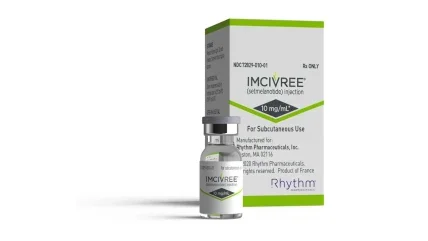
Rhythm Pharmaceuticals has received expanded marketing authorisation from the European Commission (EC) for Imcivree (setmelanotide) to include children aged two to six years.
The Boston-based rare neuroendocrine diseases-focused biopharmaceutical firm can now market Imcivree to treat obesity and control of hunger in adults and children aged two years or more with Bardet-Biedl syndrome or pro-opiomelanocortin (POMC), proprotein convertase subtilisin/kexin type 1 (PCSK1), or leptin receptor (LEPR) deficiencies.
Imcivree is a melanocortin-4 receptor (MC4R) agonist for hyperphagia and severe obesity.
It has approval from the US Food and Drug Administration (FDA) for chronic weight management in certain adults and children aged six years and older with monogenic or syndromic obesity.
The EC and the UK’s Medicines and Healthcare products Regulatory Agency (MHRA) have also authorised setmelanotide for treating obesity and controlling hunger in adults and children aged six and over.
The latest expanded approval by the EC follows the positive opinion from the European Medicines Agency’s (EMA) Committee for Medicinal Products for Human Use (CHMP) in June.
Rhythm Pharmaceuticals international head and executive vice president Yann Mazabraud said: “Today marks what we believe to be an important milestone for European patients with BBS and POMC/LEPR deficiencies ages two to six, who now have the opportunity to address the severe and insatiable hunger and early onset obesity associated with their conditions at an early age.
“Early-onset obesity that goes untreated can manifest in multiple comorbidities and negatively affect quality of life and life expectancy.
“For the first time, physicians and patients in Europe may have the opportunity to access what we believe is a meaningful treatment option for children as young as two years old.”
The biopharmaceutical firm is also progressing a broad clinical development programme for setmelanotide targeting other rare diseases.
In addition, Rhythm Pharmaceuticals is assessing investigational MC4R agonists LB54640 and RM-718, and a preclinical suite of small molecules for congenital hyperinsulinism.
Last month, the American company dosed the first patient in a Phase 2 clinical trial evaluating the oral MC4R agonist LB54640 in hypothalamic obesity.
In January, Rhythm Pharmaceuticals and LG Chem entered into a global licensing agreement for LB54640. The MC4R agonist showed dose-dependent weight reduction, a favourable safety profile, and no changes in blood pressure, heart rate, or hyperpigmentation in the Phase 1 trial.






